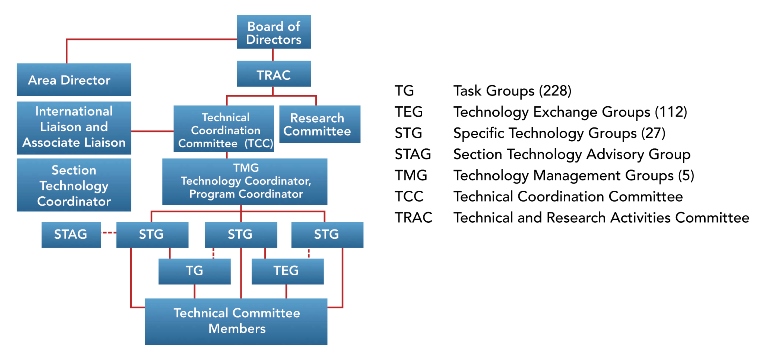NACE International is the leader in developing corrosion-related standards and reports that affect your industry, but the secret to the organization’s success is the member volunteers who drive those efforts. People such as you, who volunteer to write standards and reports, submit ballots comments (peer review), or lead one of the many technical committees, are the driving force behind the success of NACE’s standards and reports.
Want to know how you can become more active in NACE? There are many opportunities for NACE members to volunteer, and the technical committees offer many benefits such as having an impact on industry standards, developing a network of peers, and enhancing your career.
More than 300 technical committees have been formed under the direction of the Technical Coordination Committee (TCC). The TCC serves as the as the administrative and policy-making body of the committees. Within the TCC are five technology management groups (TMGs) that represent a variety of corrosion-related topics:
• TMG C1: Corrosion Prevention and Control for Concrete, Land Transportation, and Coating Technology
• TMG C2: Corrosion Prevention and Control for Pipelines and Tanks, Industrial Water Treating and Building Systems, and Cathodic Protection Technology
• TMG N1: Corrosion Prevention and Control for Oil and Gas Production, Petroleum Refining, and Gas Processing Industries
• TMG N2: Corrosion Prevention and Control for Chemical Process and Energy, Pollution Control, Air and Sea Transportation, and Military Industries
• TMG S: Corrosion Science and Technology
What are TMGs?
The TMGs provide structure and a conduit for communication between the TCC and the various specific technology groups (STGs). Each TMG has a volunteer technology coordinator who facilitates the formation of new committees, coordinates, ratifies procedures, and communicates among committees. The TMG also has one volunteer program coordinator who is responsible for organizing symposia and helping plan technical information exchanges (TIEs).
What are STGs?
Here’s where you can start making a difference right away. By joining an STG, you have taken the first step to learning how you can have an impact on shaping standards for your industry. STGs are the voting groups for NACE standards and technical committee reports. Through membership in these committees, you can learn about the various standards in progress or under review for revision and vote to make changes.
It is easy to join an STG. When you update your NACE member profile page, you can join the STGs in which you wish to participate. You will receive ballot notifications as they become available, and then just choose the ballots in which you wish to participate.
The STGs are the administrative committees in charge of task groups (TGs) and technology exchange groups (TEGs). There are 27 STGs divided among the five TMGs.

What are TGs?
These committees are a community of members who come together to write new or revise existing corrosion-related industry standards and reports. Membership in a TG offers member volunteers the opportunity for a greater level of participation. TGs usually have a chair and vice chair who are appointed by the administrating STG chair, and eight to 10 committee members who are recruited by the TG chair and vice chair. The committees usually meet to work on standards and reports during NACE conferences once or twice a year, and also via teleconference calls, Web meetings, and e-mails. With so many methods available for communicating, members can usually fit meetings into their schedules.
To join a particular TG and work on writing a standard or report, contact the TG chair to express your interest.
What are TEGs?
These committees meet during NACE conferences to discuss new technologies, and organize and sponsor symposia for the annual CORROSION conferences. The chair and vice chair are usually appointed by the administrating STG chair. Any NACE member can join a TEG. The symposium paper presentations are scheduled during NACE’s annual CORROSION conference held in the spring each year.
What about international opportunities?
NACE recognized the need to provide a higher level of participation for members located outside of North America and developed section technology advisory groups (STAGs) to create more opportunities for members throughout the world. STAG refers to a technical committee formed by international sections outside of North America to locally address the technical needs of their section membership.
Such activities of the STAG may include organizing TIEs, revising or developing NACE standards that address the local international section or area needs, promoting new technology areas that do not currently exist within TCC, or other technical initiatives.
What’s in it for you?
Membership in NACE technical committees has many benefits, and the committees are designed to provide you with the opportunity to have maximum input with minimal time commitment. As a member, you can:
• Shape industry standards—work on standards that affect the worldwide corrosion community.
• Stay ahead of the competition—keep up with the latest technologies and emerging trends of the industry.
• Enhance your career—serve on a prestigious committee to develop standards and reports.
• Network with peers—network with key decision makers and build a web of advisors and colleagues.
• Advance the association—help forward the strategic goals of NACE.
• Establish best practices—establish best practices that affect your company’s products and services.
Whether you’re a corrosion industry consultant or work for a company with an interest in corrosion control, membership in NACE technical committees is a cost-effective way to help shape industry standards, meet other like-minded professionals, and have a greater impact on the worldwide effort to control corrosion. For more information and to join a technical committee now, visit the online NACE technical committees page at nace.org/committees and click on the “Join a Technical Committee” link.